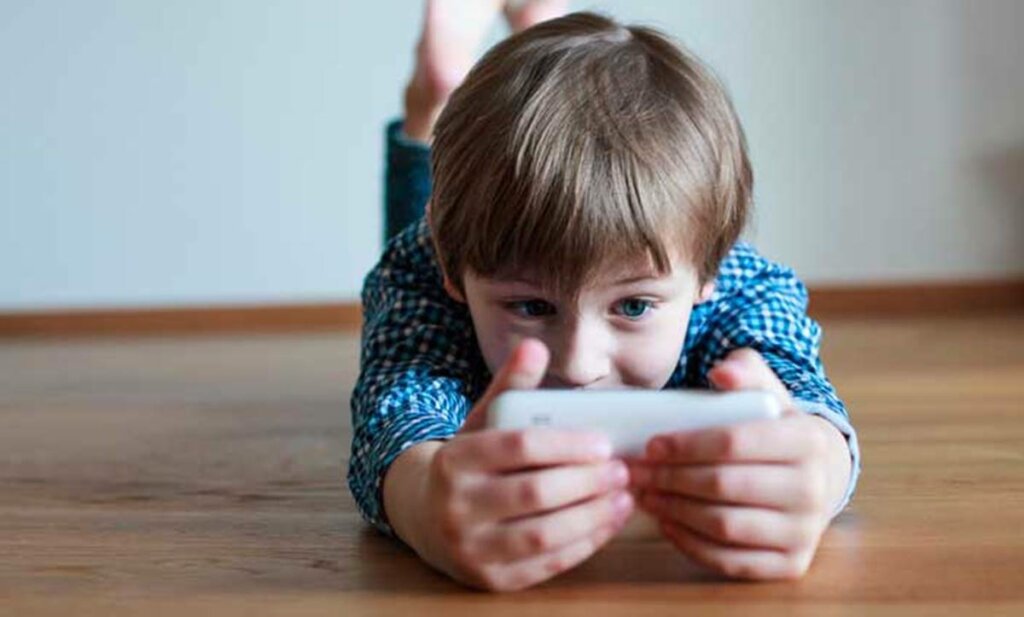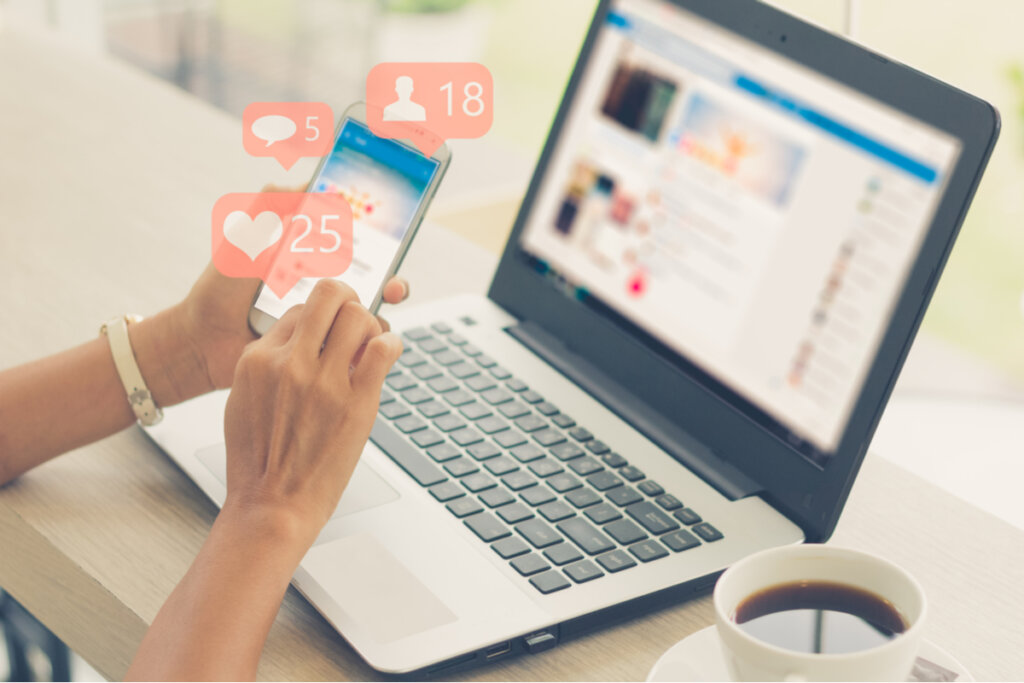Eight Ways Social Media Can Make You Hate Yourself


Written and verified by the psychologist Valeria Sabater
There are many ways that social media can make you hate yourself. However, you tend not to realize it. That’s because platforms like Facebook, Instagram, TikTok, and Twitter entertain you, connect you with whoever you want, inform you, and put the whole world at your fingertips. Who’d ever think that they could be negative and even dangerous for your mental health?
The truth is that they can be. Nevertheless, as with other facets of this universe of new technologies, everything depends on the way you use social media. However, scientific research has shown that the impact of social media is particularly dangerous in the younger population.
Digital natives or so-called generation Z (between seven and 23 years old) is the one most associated with the increase in mental health problems in this area. In fact, depression, eating disorders (ED), and self-esteem issues have increased according to data from pediatric hospitals.
Many children are entertained watching videos on TikTok of adolescents suffering from Tourette’s syndrome. That overexposure has caused them to develop nervous tics themselves. This is an unconscious reaction linked to anxiety disorders. For this reason, it’s crucial to know the risks of social media usage, which are sometimes not so obvious.

How social media can make you hate yourself
Some claim that social networks tend to bring out the worst in human beings. Criticism, arguments, trolling, fake news, and even harassment abound. However, on the other hand, it can sometimes bring out the best in us. It allows us to connect, be inspired, learn, disseminate, and even start fundraising campaigns…
In effect, social media is just another field of interaction that you need to know how to handle in order for it to act for your own benefit. As with any powerful tool, you need to use it with intelligence, respect, and balance. To do this, you must know the risks. One of them is to become aware of the ways in which social media can make you hate yourself. Your mental health will appreciate it.
“Internet is kind of like a hammer. The technology itself doesn’t determine how it’s used. It depends on the social, cultural, and economic context in which the technology is made available.”
-Noam Chomsky-
1. It provokes envy: you want what you see
Social networks are windows on the world – but with filters. Every day you see certain things with which you identify or that you’d like to have. Yearning for things drives buying behavior. It seems that Instagram is the app that causes most envy in its users.
The Federal University of Rondônia (Brazil) conducted a study indicating that many young people who follow fashion influencers experience feelings of envy.
2. You feel cheated: how could you have been so naive?
How many times have you believed a news story that turned out to be false? Not to mention those occasions when, almost without realizing it, you find yourself believing some kind of hoax that started out on Facebook.
When you feel like you’ve been a victim of a hoax or a lie you don’t only feel frustrated. In fact, you may also feel bad about yourself for having been so naive.
3. Other people’s lives appear better than yours
There was recently some rather worrying news about Facebook. A former employee of Mark Zuckerberg’s revealed that managers knew the impact Instagram would have on teenage girls.
Indeed, they knew that the self-esteem of young people would be diminished due to social comparison. They’d begin to question their bodies, their lifestyles, and every aspect of their being. This has certainly been the case. As a matter of fact, teenagers today tend to believe that influencers have a far better life than they do. This creates constant feelings of self-loathing.
4. You feel inferior
One of the ways social media can make you hate yourself is by underestimating your potential.
For example, perhaps you’re interested in a certain activity, such as photography, poetry, art, or fashion. However, on the Internet, you tend to only be faced with exceptional and outstanding people in these particular fields. Facebook, Instagram, and TikTok are particularly guilty of this. It can often make you feel unmotivated.
5. You feel constantly judged
Social networks are public places where many feel judged by the tyranny of likes. This can make even the simple fact of uploading a photo online traumatic. Because people have a tendency to criticize without thinking. Furthermore, they don’t stick around to see the damage they might’ve caused.
6. You become someone you’re not
This phenomenon is especially common among the youngest. It implies having to create an image, a specific profile that generates acceptance and success.
Selfies and filters are the tools that allow many to gain a foothold in this digital universe. However, image and even identity often become completely distorted in this process.
One of the mechanisms by which adolescents end up hating themselves is by identifying only with their virtual image and not with the real one. In fact, they only accept and like themselves through the use of filters.
7. Liquid friendships, ghosting, harassment: relationships that start with trust and end in disappointment
Who of us hasn’t ever created a link through social media to later be disappointed? That’s just the way it is. In fact, while real-life brings you the occasional disappointment, technology has greatly increased these damaging occurrences.
Therefore, one of the ways in which social networks can make you hate yourself is when you regret having trusted someone.
For example, liquid friendships abound online. People who, for a time, become your reference points and daily support, only to end up disappearing overnight.
This means you might end up feeling bad about yourself for trusting someone too quickly you haven’t even met in person.

8. You hate yourself for not being able to go offline
Social networks eat up your time. Indeed, it’s a pretty futile way of spending your time, looking at Instagram, TikTok, or Twitter. For instance, you know that sometimes social networks make you feel worse and that some days online seem to be filled with tension and hatred. You also know that much of what you see is false, that these people are selling you the kind of happiness that they don’t even feel themselves and a type of perfection that no one possesses…
However, there you are, opening up notifications, looking at the like that someone just gave you… As a matter of fact, another of the ways that social networks can make you hate yourself is when you become aware of your dependence on them.
However, realizing it is a positive step. It’s a wake-up call. An alarm bell that makes you understand that perhaps you should start to make better use of these resources. That’s the secret, to ensure that they’re simply a form of entertainment in your life, not your complete way of life.
All cited sources were thoroughly reviewed by our team to ensure their quality, reliability, currency, and validity. The bibliography of this article was considered reliable and of academic or scientific accuracy.
- Furtado, Márcia & Medeiros, Haroldo & Diniz, Joanice. (2020). FEELING OF ENVY ON SOCIAL MEDIA AND THE CONSUMPTION OF FASHION. 9. 258 – 279.
- Sternberg, N. , Luria, R., & Sheppes, G. (2021). Mental logout: Behavioral and neural correlates of regulating temptations to use social media. Psychological Science. https://doi.org/10.1177/09567976211001316
- Twenge, J. M., Haidt, J., Blake, A. B., McAllister, C., Lemon, H., & Le Roy, A. (2021). Worldwide increases in adolescent loneliness. Journal of Adolescence. Advance online publication. https://doi-org/10.1016/j.adolescence.2021.06.006
This text is provided for informational purposes only and does not replace consultation with a professional. If in doubt, consult your specialist.








